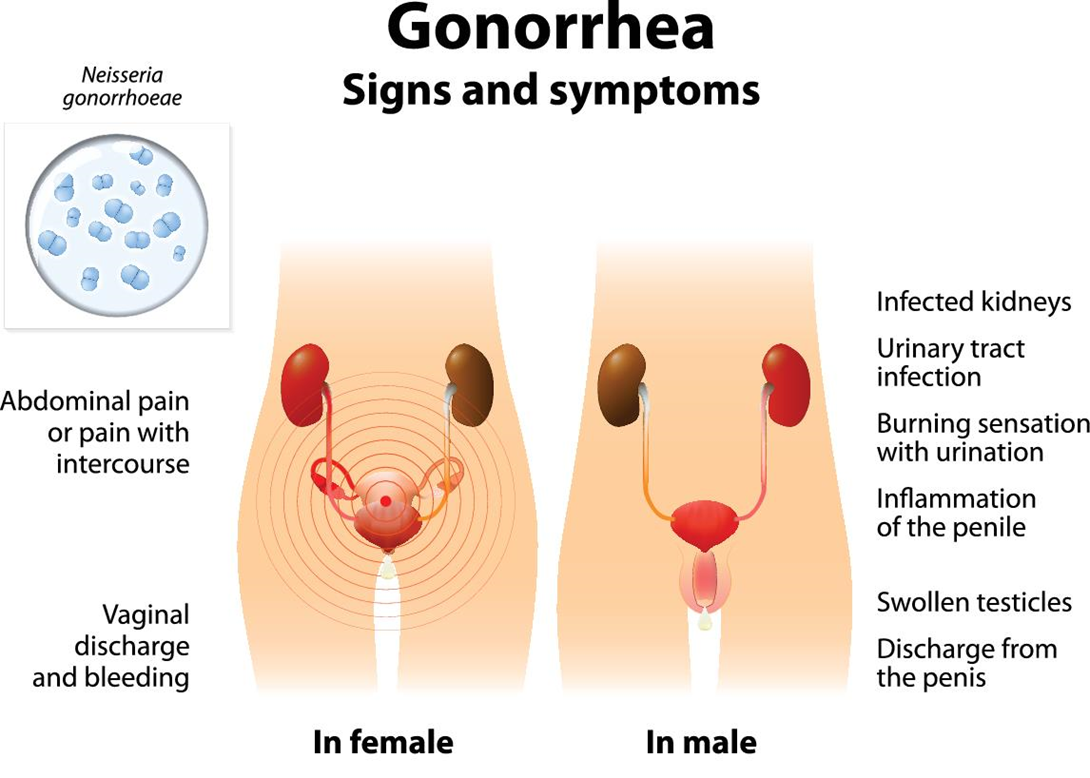Which of the following sexually transmitted infections is caused by a bacterium called Neisseria gonorrhoeae, often produces no symptoms, but can be treated with antibiotics? If symptoms occur, they may include painful urination and discharge from the penis or vagina. If left untreated, the infection can result in more serious long-term problems, including infertility, pain, and joint problems.
Human papillomavirus
Gonorrhea
Herpes simplex virus
Cytomegalovirus
The Correct Answer is B
Choice A reason: Human papillomavirus is incorrect because it is not caused by a bacterium, but by a virus. It can cause genital warts and cervical cancer, but it cannot be cured with antibiotics.
Choice B reason: Gonorrhea is correct because it is caused by a bacterium called Neisseria gonorrhoeae, often produces no symptoms, but can be treated with antibiotics. If symptoms occur, they may include painful urination and discharge from the penis or vagina. If left untreated, the infection can result in more serious long-term problems, including infertility, pain, and joint problems.
Choice C reason: Herpes simplex virus is incorrect because it is not caused by a bacterium, but by a virus. It can cause genital herpes, which is marked by painful blisters and sores in the genital area. It cannot be cured with antibiotics, but antiviral medications can help reduce the frequency and severity of outbreaks.
Choice D reason: Cytomegalovirus is incorrect because it is not caused by a bacterium, but by a virus. It usually causes mild or no symptoms in healthy people, but can be serious in people with weakened immune systems or unborn babies. It cannot be cured with antibiotics, but antiviral medications can help treat the symptoms.

Nursing Test Bank
Naxlex Comprehensive Predictor Exams
Related Questions
Correct Answer is A
Explanation
Choice A reason: The HPV vaccine can help prevent cervical cancer, as it protects against the most common types of HPV that cause cervical cancer. HPV is a sexually transmitted infection that can infect the cervix and cause abnormal cell changes that may lead to cancer. The HPV vaccine is recommended for both males and females between the ages of 9 and 26.
Choice B reason: The HPV vaccine will not protect you from all types of the virus, as there are more than 100 types of HPV, and the vaccine only covers 9 of them. However, these 9 types are responsible for about 90% of cervical cancers and 80% of anal cancers. The vaccine also does not protect against other sexually transmitted infections, such as chlamydia, gonorrhea, or HIV.
Choice C reason: You will not need to have a booster vaccination each year, as the HPV vaccine is given in a series of 2 or 3 doses, depending on the age of the person. The vaccine provides long-lasting protection, and no additional doses are needed after completing the series.
Choice D reason: You will still need to get a routine cervical exam, as the HPV vaccine does not eliminate the risk of cervical cancer completely. The vaccine does not protect against all types of HPV, and some people may already be infected with HPV before getting the vaccine. Therefore, regular screening with a Pap test and/or an HPV test is still recommended for women aged 21 to 65 to detect any abnormal cells or HPV infection in the cervix.
Correct Answer is D
Explanation
Choice A reason: The incidence of hepatitis C is not decreasing, but rather increasing, especially among young people who inject drugs. Hepatitis C is a chronic infection that can lead to liver damage and cancer.
Choice B reason: Hepatitis B is more contagious than HIV, as it can be transmitted by blood, semen, vaginal fluids, and other body fluids. Hepatitis B can also cause chronic infection and liver problems.
Choice C reason: A vaccine exists for hepatitis B but not for hepatitis C. Hepatitis B vaccine is recommended for all infants, children, and adults who are at risk of exposure. Hepatitis C vaccine is still under development.
Choice D reason: Hepatitis A is caused by eating contaminated food or drinking polluted water. It is an acute infection that usually resolves on its own. Hepatitis A vaccine is available for travelers and people who live in areas with poor sanitation.
Whether you are a student looking to ace your exams or a practicing nurse seeking to enhance your expertise , our nursing education contents will empower you with the confidence and competence to make a difference in the lives of patients and become a respected leader in the healthcare field.
Visit Naxlex, invest in your future and unlock endless possibilities with our unparalleled nursing education contents today
Report Wrong Answer on the Current Question
Do you disagree with the answer? If yes, what is your expected answer? Explain.
Kindly be descriptive with the issue you are facing.
